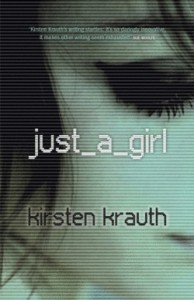 Title: just_a_girl (Goodreads)
Title: just_a_girl (Goodreads)
Author: Kirsten Krauth
Published: University of Western Australia Publishing, 2013
Pages: 272
Genres: Contemporary
My Copy: ARC from Publisher
Buy: Amazon, Book Depository (or visit your local Indie bookstore)
“I’m just a girl, Take a good look at me. Just your typical prototype” – Just a Girl by No Doubt.
just_a_girl tells the story of Layla, a fourteen year old girl navigating the waters of adulthood and a budding sexuality. The novel is told from the three different perspectives, Layla, her religious mother Margot, and Tadashi, a stranger on a train. Through these three different sets of eyes we begin to see the complexities of growing up beginning to form.
This novel is marketed as “Puberty Blues for the digital age, [or] Lolita with a webcam”, a description that I’m not too pleased about but I can see where it comes from. just_a_girl (also Layla’s screen name) serves as a psychological look into a teenager’s life in a world that that forces her to grow up far too quickly. It is that type of thought provoking novel that gives you far more questions than answers.
What I loved about this book is the way that Kirsten Krauth looks at the life of a teenager girl but never blames or suggests that her problems are the cause of one thing. Can we blame the internet for the struggles that Layla faces? Maybe, but it is not the sole cause. We could accuse her mother for being ignorant and too focused on religion but then what teenager wants to share that much detail with their parents? I could go on; there are so many little defining factors that make up this struggle.
just_a_girl is a novel that explores different facets of growing up, isolation, loneliness, friendship, love, relationships, religion, sex and the digital world. Layla feels like she has to navigate through life on her own and the reader gets to watch this progress from three different points of view. The three narratives all bring balance and complement each other; With Layla we have a sense of confusion and urgency, Margot provides some ignorance and concern towards her daughter in a stream of consciousness, while Tadashi has a gentle, quiet observation of what he sees happening.
The raw emotion that Kirsten Krauth invests into her debut novel is the real reason just_a_girl works. There is something real and honest with everything that is going on within the pages. This is both scary and uncomfortable but it raises so many important questions. I won’t list some of the questions I asked, it is something that each reader needs to discover for themselves.
Layla struggles to navigate her life, trying to make a connection is such great topic to explore and Krauth did it so well. I was very impressed with this novel, even if I would never associate it with Lolita; I think the two novels are vastly different and comparing to a masterpiece just isn’t fair to a debut author. I could stick all the standard ‘dark’, ‘gritty’ or ‘transgressive’ labels to just_a_girl but I would rather say that is thought provoking and asks some very important questions. It is nice to see a contemporary Australian debut take a risk and pull it off, I highly recommend just_a_girl.


 Title: Grasshopper Jungle (
Title: Grasshopper Jungle ( Title: Perv: The Sexual Deviant in All of Us (
Title: Perv: The Sexual Deviant in All of Us ( Title: Twilight (
Title: Twilight (